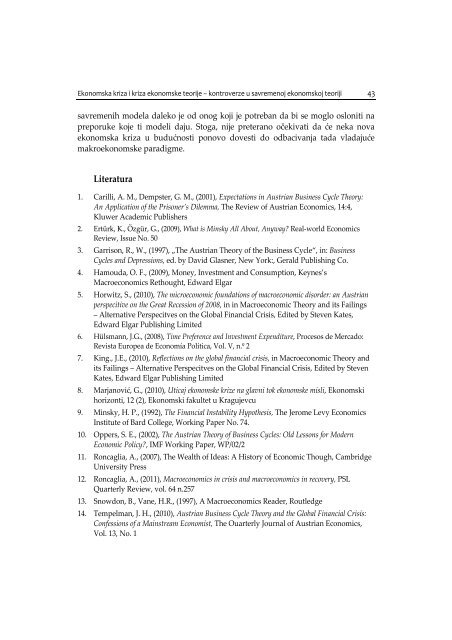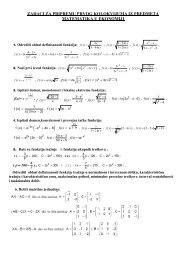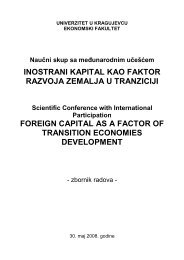institucionalne promene kao determinanta privrednog razvoja srbije
institucionalne promene kao determinanta privrednog razvoja srbije
institucionalne promene kao determinanta privrednog razvoja srbije
You also want an ePaper? Increase the reach of your titles
YUMPU automatically turns print PDFs into web optimized ePapers that Google loves.
Ekonomska kriza i kriza ekonomske teorije – kontroverze u savremenoj ekonomskoj teoriji 43<br />
savremenih modela daleko je od onog koji je potreban da bi se moglo osloniti na<br />
preporuke koje ti modeli daju. Stoga, nije preterano očekivati da će neka nova<br />
ekonomska kriza u budućnosti ponovo dovesti do odbacivanja tada vladajuće<br />
makroekonomske paradigme.<br />
Literatura<br />
1. Carilli, A. M., Dempster, G. M., (2001), Expectations in Austrian Business Cycle Theory:<br />
An Application of the Prisoner’s Dilemma, The Review of Austrian Economics, 14:4,<br />
Kluwer Academic Publishers<br />
2. Ertürk, K., Özgür, G., (2009), What is Minsky All About, Anyway? Real‐world Economics<br />
Review, Issue No. 50<br />
3. Garrison, R., W., (1997), „The Austrian Theory of the Business Cycle“, in: Business<br />
Cycles and Depressions, ed. by David Glasner, New York:, Gerald Publishing Co.<br />
4. Hamouda, O. F., (2009), Money, Investment and Consumption, Keynes’s<br />
Macroeconomics Rethought, Edward Elgar<br />
5. Horwitz, S., (2010), The microeconomic foundations of macroeconomic disorder: an Austrian<br />
perspecitive on the Great Recession of 2008, in in Macroeconomic Theory and its Failings<br />
– Alternative Perspecitves on the Global Financial Crisis, Edited by Steven Kates,<br />
Edward Elgar Publishing Limited<br />
6. Hülsmann, J.G., (2008), Time Preference and Investment Expenditure, Procesos de Mercado:<br />
Revista Europea de Economía Política, Vol. V, n.º 2<br />
7. King., J.E., (2010), Reflections on the global financial crisis, in Macroeconomic Theory and<br />
its Failings – Alternative Perspecitves on the Global Financial Crisis, Edited by Steven<br />
Kates, Edward Elgar Publishing Limited<br />
8. Marjanović, G., (2010), Uticaj ekonomske krize na glavni tok ekonomske misli, Ekonomski<br />
horizonti, 12 (2), Ekonomski fakultet u Kragujevcu<br />
9. Minsky, H. P., (1992), The Financial Instability Hypothesis, The Jerome Levy Economics<br />
Institute of Bard College, Working Paper No. 74.<br />
10. Oppers, S. E., (2002), The Austrian Theory of Business Cycles: Old Lessons for Modern<br />
Economic Policy?, IMF Working Paper, WP/02/2<br />
11. Roncaglia, A., (2007), The Wealth of Ideas: A History of Economic Though, Cambridge<br />
University Press<br />
12. Roncaglia, A., (2011), Macroeconomics in crisis and macroeconomics in recovery, PSL<br />
Quarterly Review, vol. 64 n.257<br />
13. Snowdon, B., Vane, H.R., (1997), A Macroeconomics Reader, Routledge<br />
14. Tempelman, J. H., (2010), Austrian Business Cycle Theory and the Global Financial Crisis:<br />
Confessions of a Mainstream Economist, The Ouarterly Journal of Austrian Economics,<br />
Vol. 13, No. 1






